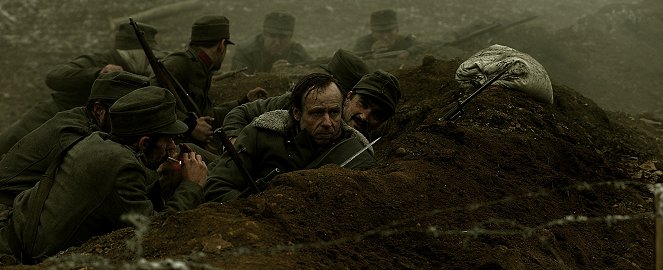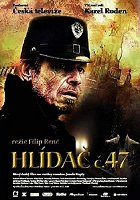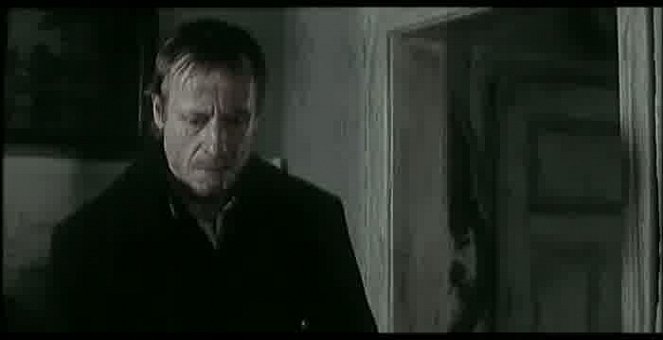Directed by:
Filip RenčCinematography:
Karel FairaislComposer:
Jiří ŠkorpíkCast:
Karel Roden, Lucia Siposová, Václav Jiráček, Vladimír Dlouhý, Norbert Lichý, Zdeněk Dušek, Vladimír Kulhavý, Luboš Veselý, Zuzana Šavrdová, Radka Fidlerová (more)Plots(1)
Josef Douša moves into the railway guard’s house on the outskirts of a small town. Having just returned from the butchery of trench warfare during the World War I, he is hoping to forget his horrendous experiences in this secluded dwelling with a beautiful young wife by his side. His inner equanimity is further upset by the fact that his wife’s beauty and sex appeal evidently isn’t lost on two men from the nearby town – Ferda, a violent young grave-digger, and Bartík, a hypocritical sacristan. One day Anna really does succumb to Ferda’s animal magnetism. While her husband does not know of what happened. Floundering between doubt and faith in his wife, Josef ultimately loses his hearing and the doctor grants him the status of war invalid. He receives a pension but has to leave the guard house and his job. After a short time his hearing returns, but Josef hides this fact from the whole world and even his wife, hoping to find out if his suspicions about Anna and Ferda are true. Only with superhuman effort does he withstand the sufferings he must face when, as a “deaf” man, he has to listen to the caustic remarks made by people about him and his wife. The story comes to a tragic finale and the victors are death, retribution and solitude. (official distributor synopsis)
(more)Videos (1)
Reviews (4)
I actually don't know what I expected from the movie "Guard at Number 47." Maybe a bit of a war movie, perhaps a little action. I'm not saying that there isn't anything like that, but it's just about snippets, memories of the main character, Josef Douša, in the trenches. The interweaving of reality with memories is really strong, intense, and along with Karel Roden's acting in the lead role, they are the greatest positives of the film, which is nothing more than a story about a love triangle and the consequences that such a situation can have and does have. Sometimes it just doesn't pay off when you save someone's life. Within ten to fifteen minutes, the basic plot is established, which is also almost immediately resolved. The film doesn't bring any surprises and in terms of the screenplay, it's a classic story that doesn't stand out in any way. It was mainly a great opportunity for Roden, who truly played a concert and in moments when he has to play a deaf character, he is absolutely perfect. Apart from his appearance, his voice, which is also unforgettable, helps him in that as well. Lucia Siposová or Václav Jiráček next to him then look like two students who have just enrolled at FAMU and already think they can play in the premier league. Their acting is not very suggestive and not very believable. They are not characters, they just play them. Roden is a character, Roden is Douša. When I think about those actors, I certainly can't forget about Vladimír Dlouhý, who is incredibly sleazy and the second-best actor in the film after Roden. Filip Renč managed to shoot a film that doesn't have as much potential as it may seem. Actually, it is a chamber film of one person who is not living a good life, but on the contrary, is suffering and it doesn't seem like it will ever end. More: http://www.filmovy-denik.cz/2012/12/umirajici-zvire-4-vanoce-slunce-seno-2.html
()
Probably the best movie by Filip Renč and the first of its kind, where after watching it, I didn't feel the need to be enthusiastic about my dance steps or satisfy my shopping cravings. I don't particularly like this director because of his music video-like and mostly commercial aesthetics, so I can't give it more than four stars, even if I wanted to. I don't take away from the film its decent craftsmanship, good camera work, or soundtrack, but it seems to me that the director is always playing for effect, so the characters overact a little, displaying overly exaggerated emotions. The music and visuals aggressively attack the viewer's senses - and maybe I am just biased because I don't agree with Renč's political and lobbying contacts and business deals. Overall impression: 60%.
()
Karel Roden - good. Vladimir Dlouhý - good. Václav Jiráček - terrible. Lucia Siposová - only good to look at. Cinematography - beautiful. Music - decent. Direction - traditional Renč, or weak and not very interesting. I can imagine this film at 8:00 pm on Sunday on TV, shortened to an hour and a half, or two parts. It wasn’t a good fit for the movie theater. Two and a bit.
()
Renč's version of the film is fortunately quite different from the previous adaptations by Rovenský and Haas. We can find differences on all levels, from the setting in the winter landscape, the accentuation of the fighting in the trenches to the completely differently portrayed relationship between the Douša family - even their elder son is missing and the spaces of the inn and the cemetery are very important. The merchant became a gravedigger and the aged minister got a lot of space. Yet the main motif remains, as well as the oppressive atmosphere, but the motivations of the main characters' actions are more akin to today. The morality of the true rural people of the 1920s is now incomprehensible to the wider world. In addition to the beautiful images, the film also offers excellent performances by Roden and Vladimír Dlouhý, but unfortunately, their teammates Siposová and Jiráček are very weak. Siposová at least managed to be stylized, but Jiráček never became a real actor, although he had many opportunities to do se.
()
Gallery (46)
Photo © Česká televize



Ads